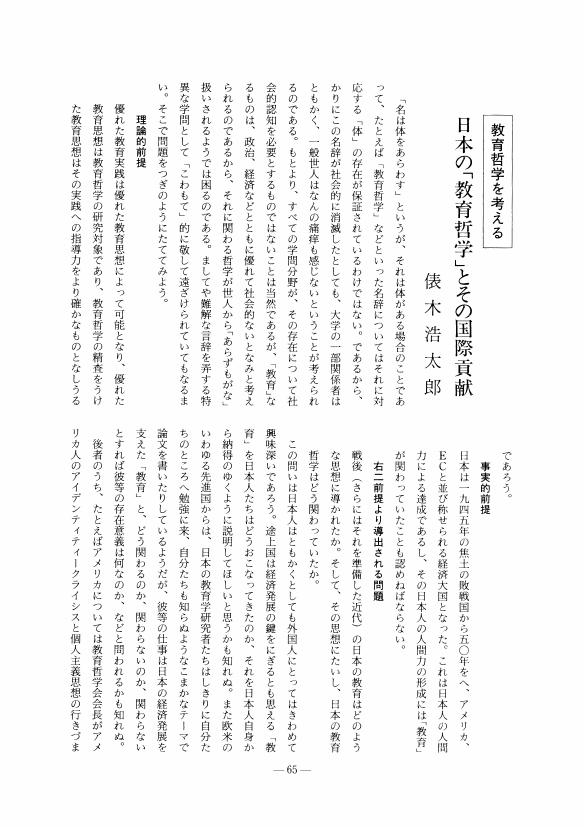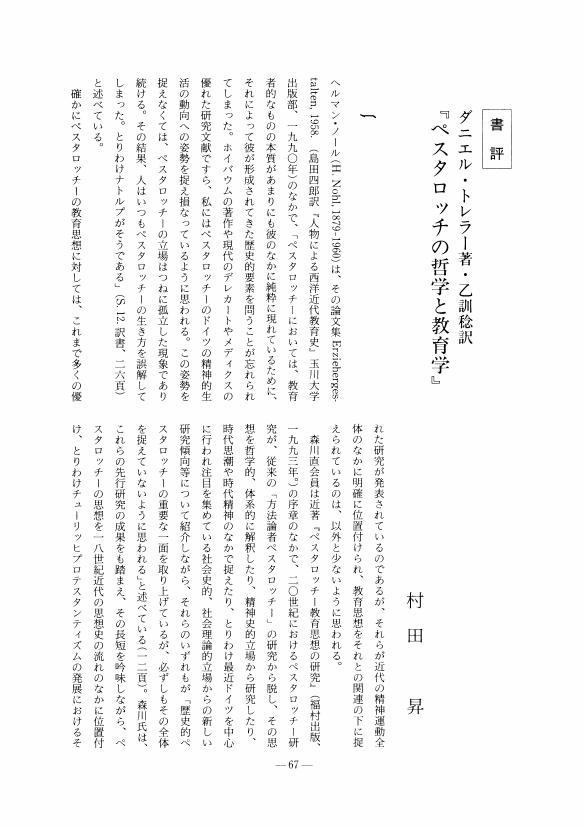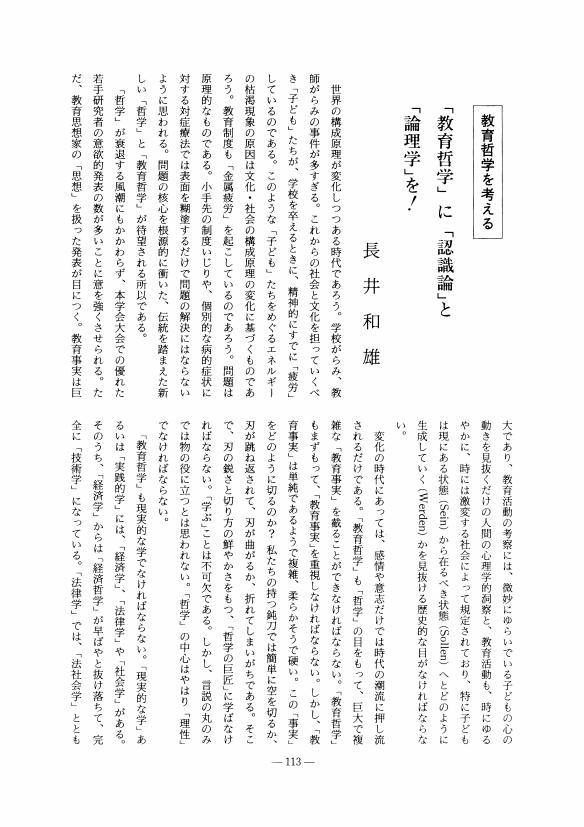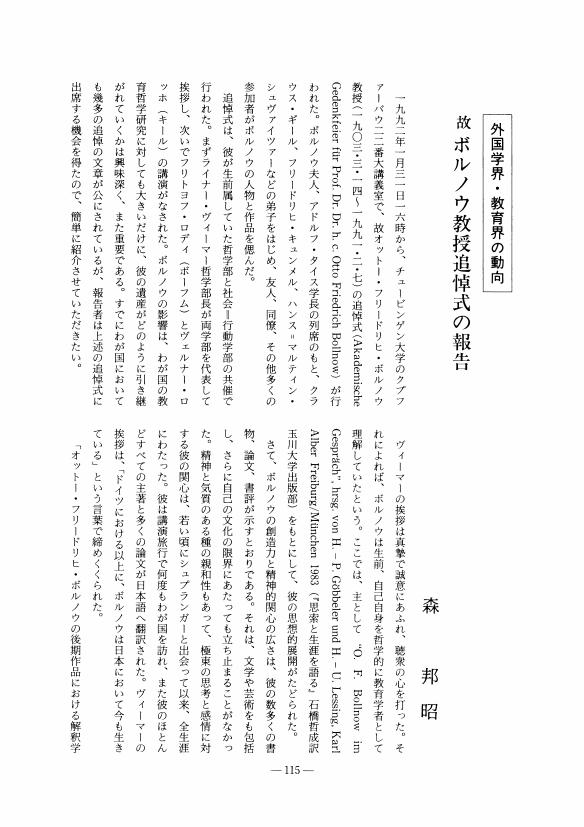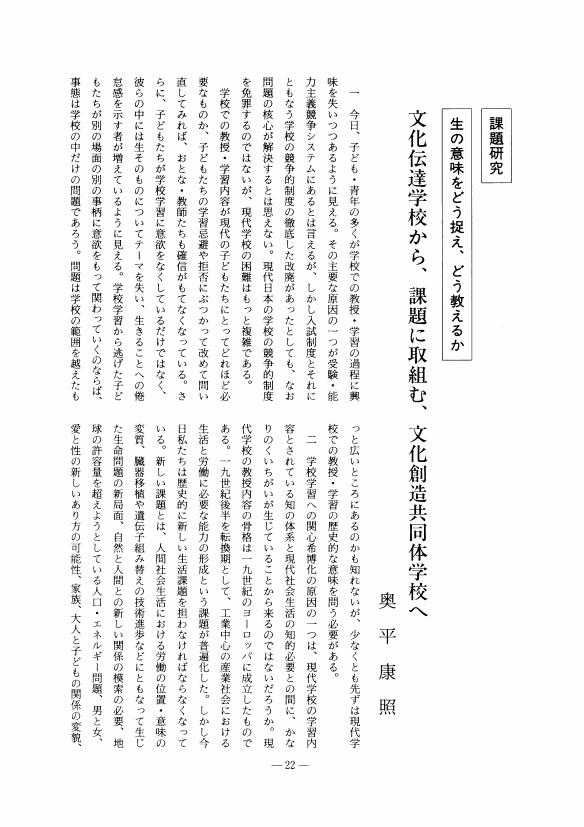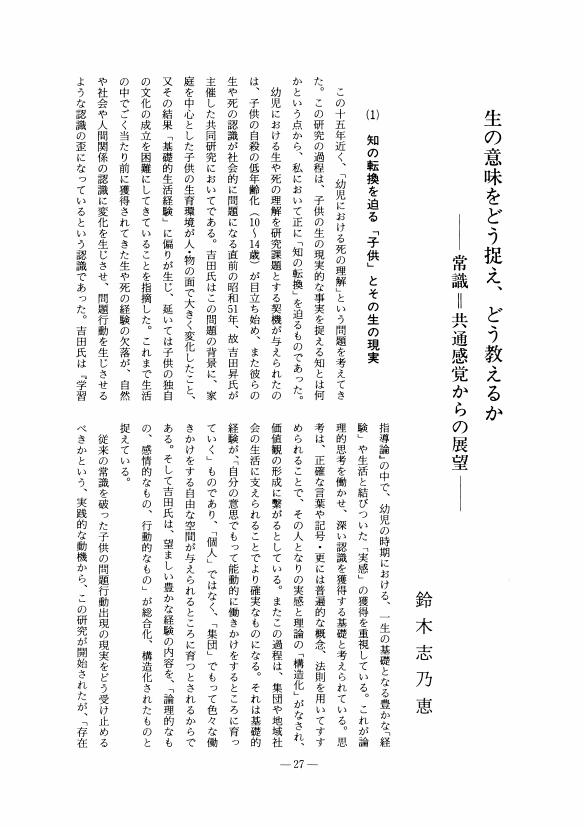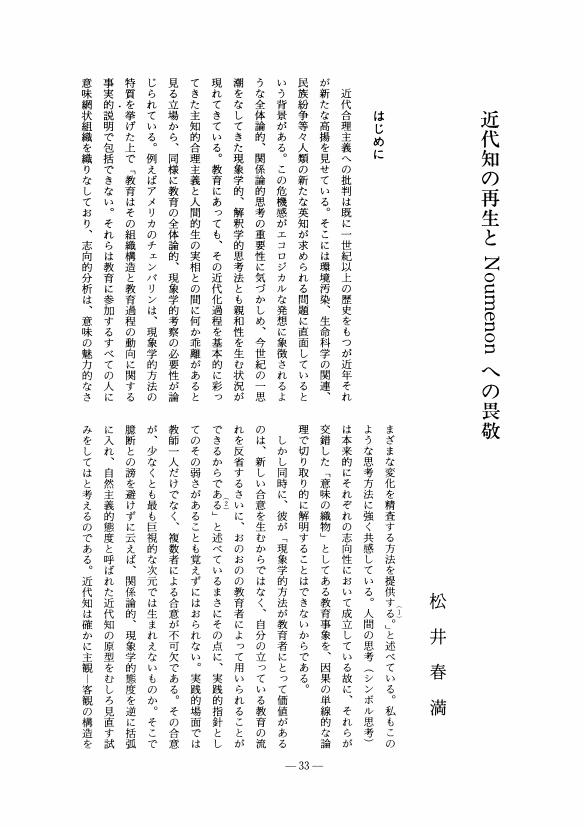- 著者
- 西岡 けいこ
- 出版者
- 教育哲学会
- 雑誌
- 教育哲学研究 (ISSN:03873153)
- 巻号頁・発行日
- vol.1993, no.68, pp.41-53, 1993-11-10 (Released:2009-09-04)
- 参考文献数
- 14
Le but de cet article est de montrer l'importance, dans l'ouvrage d'Henri Wallon (1879-1962), “Les origines de la pensée chez l'enfant”, publié en 1945, du point de vue de l'enfant. H. Wallon veut saisir l'éveil de la pensée schez l'enfant dans sa relation de celui-ci avec son interlocuteur. Ses recherches sur la pensée chez l'enfant font état d'analyses liées a la notion de “couple”, (d'altéritè). Cette notion montre la capacité qu' a l'enfant d'adopter le systéme de pansée de l'adulte et en méme temps de le modifier par lui-méme en se l'appropriant. Les recherches de Wallon, centrées sur la notion de “couple” (altérité), prennent ainsi un caractére phénoménologique.
1 0 0 0 OA イデオロギー・権力・教育 ドイツと日本の場合
- 著者
- クラウス ルーメル
- 出版者
- 教育哲学会
- 雑誌
- 教育哲学研究 (ISSN:03873153)
- 巻号頁・発行日
- vol.1993, no.68, pp.54-64, 1993-11-10 (Released:2009-09-04)
1 0 0 0 OA 教育哲学を考える 日本の「教育哲学」とその国際貢献
- 著者
- 俵木 浩太郎
- 出版者
- 教育哲学会
- 雑誌
- 教育哲学研究 (ISSN:03873153)
- 巻号頁・発行日
- vol.1993, no.68, pp.65-66, 1993-11-10 (Released:2009-09-04)
1 0 0 0 OA ダニエル・トレラー著・乙訓稔訳『ペスタロッチの哲学と教育学』
- 著者
- 村田 昇
- 出版者
- 教育哲学会
- 雑誌
- 教育哲学研究 (ISSN:03873153)
- 巻号頁・発行日
- vol.1993, no.68, pp.67-71, 1993-11-10 (Released:2009-09-04)
1 0 0 0 OA 課題研究についての総括的報告
- 著者
- 堀尾 輝久 長井 和雄
- 出版者
- 教育哲学会
- 雑誌
- 教育哲学研究 (ISSN:03873153)
- 巻号頁・発行日
- vol.1993, no.67, pp.39-45, 1993-05-10 (Released:2009-09-04)
1 0 0 0 OA M・ブーバーの〈対話〉とK・ヤスパースの〈実存的コミュニケーション〉との比較研究
- 著者
- 松丸 啓子
- 出版者
- 教育哲学会
- 雑誌
- 教育哲学研究 (ISSN:03873153)
- 巻号頁・発行日
- vol.1993, no.67, pp.46-58, 1993-05-10 (Released:2010-05-07)
- 参考文献数
- 58
The concepts of M. Buber's 'dialogue' and K. Jasper's 'existential communication' have some points in common. Especially both emphasize that man concerns himself with the other's self. Most of traditional existential education tended to ignore this point. Therefore, this education has fallen into some kind of individualism. In this paper, we discuss the problem of how to realize existential education drawing on an ontological comparison between 'dialogue' and 'existential communication'.In conclusion, our views on the possibility of existential education are presented.First of all, existential education can be developed by the realization of existential relations between man and man.Secondly, in the traditional discussions on existential education in Japan, metaphysical aspects of existential thought were not considered sufficiently. We found that M. Buber's 'dialogue' and K. Jasper's 'existential communication' help us to work out a solution.But, another difficulty arises here. As the relation of 'I-Thou' relates to the relation of and the 'existential communication' relates closely to other immanent communications, 'dialogue' and 'existential communication' are related only in a moment. Therefore, neither can cover the entire range of educational matters.Besides, as both are basically realized between a person and another person, a problem concerning 'the persons who are not met' has been discussed constantly. Moreover, at the moment of the realization of both, the teacher and the student meet each other as 'personality'. Here, they are beyond the educational frame of 'teacher' and 'student'.As mentioned above, 'dialogue' and 'existential communication' pose difficult problems in education. But, those difficult problems make us face a fundamental question what education should be.
1 0 0 0 OA エラスムスの子ども観
- 著者
- 大川 洋
- 出版者
- 教育哲学会
- 雑誌
- 教育哲学研究 (ISSN:03873153)
- 巻号頁・発行日
- vol.1993, no.67, pp.59-72, 1993-05-10 (Released:2009-09-04)
- 参考文献数
- 53
The following five points can be listed to summarize the special characteristics of Erasmus' outlook on childhood.1. Since Erasmus does no regard mental maturity to coincide with physical maturity, the word 'puer' (child) includes a wide range of application.2. Erasmus' outlook on childhood is affected by his understanding of the sacraments. There are various opinions on the question of the appropriate age for receiving baptism, confirmation and holy communion, and these opinions are based on the outlook on childhood. Erasmus thinks that a child under seven does not sin consciously, but after seven has a proclivity to sin, and after sixteen he is exposed to numerous temptations.3. As children's model for imitation, Erasmus does not present the image of the adult Christ, but rather that of the twelve year old child Jesus.4. Erasmus not only stresses the possibility, the necessity and the usefulness of infant education, but also directs his attention to the individual characteristics of children.5. Erasmus does not adapt children to the secular world, but rather separates them from it for the sake of education.
- 著者
- 杉山 精一
- 出版者
- 教育哲学会
- 雑誌
- 教育哲学研究 (ISSN:03873153)
- 巻号頁・発行日
- vol.1993, no.67, pp.73-85, 1993-05-10 (Released:2010-01-22)
- 参考文献数
- 40
Das Ziel dieser Abhandlung ist nachzuweisen daß man die Queue der Unterrichtslehre Herbart's in seinem Studium der Mathematik finden kann. Herbart fängt dieses Studium früher als das Studium der Pädagogik an, und das hängt mit der Entwicklung seiner Philosophie zusammen.Er studiert zuerst Schelling's Frühschriften sehr eifrig während seiner Jenaer Universitätszeit und nimmt der traditionellen Metaphysik gegenüber eine ablehnende Haltung ein.Nach diesem Studium vertieft er sich in das Studium der Mathematik. Er lehnt es ab, Kant's 'Ding an sich' und die Intellektuelle Anschauung unterstützen, das heißt, das Gebiet der Erkenntnis nicht in der Erfahrungswelt sondern in der Transzendentalwelt zu suchen. Er versucht, die Mathematik als erste Wissenschaft aufzustellen und damit die traditionelle Metaphysik zu überwinden.Dieses Ziel läßt sich erst verwirklichen durch die Ausbildung eines' aufmerksamen Blicks' auf den Gegenstand und das Bemühen um tiefe Selbstreflexion. Die Mathematik soil diese zwei Aufgaben erfüllen. In der Folge forscht Herbart über Pestalozzi's Methode, weil Ziel dieser Methode ist, eben die Klarheit der Begriffe zu gewinnen.
1 0 0 0 OA ニーチェにおける言語と自己形成の問題
- 著者
- 宮澤 知江美
- 出版者
- 教育哲学会
- 雑誌
- 教育哲学研究 (ISSN:03873153)
- 巻号頁・発行日
- vol.1993, no.67, pp.86-99, 1993-05-10 (Released:2009-09-04)
- 参考文献数
- 27
Nietzsche attached importance to the problem how to capture the first nature during the process of our self-education. By the first nature is meant the expression of one's original existence by becoming able to express oneself by one's own language without being tossed about by existing values. But it is difficult for us to arrive at one' s own language because varius patterns are forced on us during the effort to reach our own language. That is, we are disturbed by existing values and by words from books written by others - this was also Nietzsche's own experience. In this fashion, indeed, language had an important meaning in the process of Nietzsche's self-education. In this paper, the relation between the development of Nietzsche's self-education and language, his language theory, the objective meaning of language, the attitude of the subject toward objective language are being clarified and some thoughts are added on the problem how we grasp variety, i. e. the objective language world and how we should deal with our own language in order to arrive at the first nature.
1 0 0 0 OA 教育・研究の分野としての教育哲学の成立過程と課題
- 著者
- 大浦 猛
- 出版者
- 教育哲学会
- 雑誌
- 教育哲学研究 (ISSN:03873153)
- 巻号頁・発行日
- vol.1993, no.67, pp.100-112, 1993-05-10 (Released:2010-01-22)
- 参考文献数
- 25
1 0 0 0 OA 教育哲学を考える 「教育哲学」に「認識論」と「論理学」を!
- 著者
- 長井 和雄
- 出版者
- 教育哲学会
- 雑誌
- 教育哲学研究 (ISSN:03873153)
- 巻号頁・発行日
- vol.1993, no.67, pp.113-114, 1993-05-10 (Released:2009-09-04)
1 0 0 0 OA 外国学界・教育界の動向 故ボルノウ教授追悼式の報告
- 著者
- 森 邦昭
- 出版者
- 教育哲学会
- 雑誌
- 教育哲学研究 (ISSN:03873153)
- 巻号頁・発行日
- vol.1993, no.67, pp.115-120, 1993-05-10 (Released:2009-09-04)
- 著者
- 新井 保幸
- 出版者
- 教育哲学会
- 雑誌
- 教育哲学研究 (ISSN:03873153)
- 巻号頁・発行日
- vol.1993, no.67, pp.121-126, 1993-05-10 (Released:2009-09-04)
1 0 0 0 OA 「インドクトリネーション」再考 思想史的展望と現代日本の課題
- 著者
- 沼田 裕之
- 出版者
- 教育哲学会
- 雑誌
- 教育哲学研究 (ISSN:03873153)
- 巻号頁・発行日
- vol.1993, no.67, pp.1-6, 1993-05-10 (Released:2009-09-04)
1 0 0 0 OA 「行為の知」への道を探る 学理論の視点から
- 著者
- 鈴木 晶子
- 出版者
- 教育哲学会
- 雑誌
- 教育哲学研究 (ISSN:03873153)
- 巻号頁・発行日
- vol.1993, no.67, pp.6-10, 1993-05-10 (Released:2009-09-04)
- 参考文献数
- 5
1 0 0 0 OA 授業における「教え込み」の発見と拒否
- 著者
- 齋藤 勉
- 出版者
- 教育哲学会
- 雑誌
- 教育哲学研究 (ISSN:03873153)
- 巻号頁・発行日
- vol.1993, no.67, pp.11-15, 1993-05-10 (Released:2009-09-04)
- 参考文献数
- 7
1 0 0 0 OA 研究討議の概要報告
- 著者
- 市村 尚久 原 聡介
- 出版者
- 教育哲学会
- 雑誌
- 教育哲学研究 (ISSN:03873153)
- 巻号頁・発行日
- vol.1993, no.67, pp.16-21, 1993-05-10 (Released:2009-09-04)
1 0 0 0 OA 生の意味をどう捉え、どう教えるか 文化伝達学校から、課題に取組む、文化創造共同体学校へ
- 著者
- 奥平 康照
- 出版者
- 教育哲学会
- 雑誌
- 教育哲学研究 (ISSN:03873153)
- 巻号頁・発行日
- vol.1993, no.67, pp.22-26, 1993-05-10 (Released:2009-09-04)
1 0 0 0 OA 生の意味をどう捉え、どう教えるか 常識=共通感覚からの展望
- 著者
- 鈴木 志乃恵
- 出版者
- 教育哲学会
- 雑誌
- 教育哲学研究 (ISSN:03873153)
- 巻号頁・発行日
- vol.1993, no.67, pp.27-32, 1993-05-10 (Released:2009-09-04)
1 0 0 0 OA 近代知の再生とNoumenonへの畏敬
- 著者
- 松井 春満
- 出版者
- 教育哲学会
- 雑誌
- 教育哲学研究 (ISSN:03873153)
- 巻号頁・発行日
- vol.1993, no.67, pp.33-39, 1993-05-10 (Released:2009-09-04)
- 参考文献数
- 13

